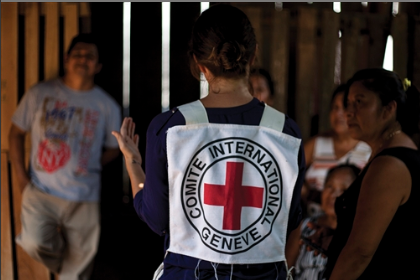Humanitarian work can be rewarding – but it can also take a toll on a person’s life balance. For the ICRC, physical security and protection of staff in dangerous settings is an unequivocal priority but there is equally the matter of their mental health, wherein threats can be less visible but no less damaging.
This is why new techniques and strategies are always in development within the ICRC’s Staff Health Centre of Expertise, which works to capitalize on the lessons learned from working with affected populations in combination with evidence and results-based interventions developed in the domain of occupational health.
Working in conflict zones, ICRC staff are susceptible to similar levels of psychological harm as the people they are there to help. After all, shared experiences mean shared risks. Therefore, the ICRC aims to continuously protect its workers from trauma, stress, or burnout but this requires vigilance and innovation.
The ICRC is implementing a new staff health strategy that recognizes the growing pressures on staff, mobile and resident, and places increased emphasis on mental health and psychosocial support.
“The type of work our staff does, the type of places where they work, are risk factors,” says organizational psychologist Carla Uriarte, who is part of the wider staff health team with a mission is to protect and support the mental health of all ICRC staff – some 21,000 people in more than 100 countries.
The Building Blocks of Prevention
The new approach aims to be proactive, not simply responsive, drawing on the ICRC’s wealth of experience treating the needs of people caught up in violence and conflict. “What is innovative is that the new strategy aims at prevention and support, and it has adapted that approach from what we already do for populations we work with,” Uriarte says.
The ICRC is taking what it has learned in the field and is applying it to the organization. “Mental health and psychosocial support has been consolidated for the populations, and what we have done is adapt that to our own population, which are the employees,” she explains.
In a conflict zone, the first intervention is often to provide a displaced population with the basics: safety, shelter, food, water, the ability to communicate with family and friends and restore severed community links. These are the fundamentals of psychosocial support.
For ICRC staff, the equivalent is creating healthy working environments, a transversal challenge involving managers, leaders, and colleagues across the organization: workload, work-life balance, good relations with co-workers. What Uriarte calls “the building blocks of prevention”.
Increased Needs, Increased Understanding
With that foundation, the next step is to ensure staff feel supported, by peers as well as managers, that open and honest conversations can be held, turning the workplace into a safe space.
It is a shift in culture aimed at creating a “community of colleagues that is caring and supportive,” who can provide the “social support [that] is the cornerstone of prevention in mental health”.
A recent study revealed that as many as 40% of ICRC staff are at risk of developing mental health conditions, underscoring the crucial need for prevention.
“There are increased needs, but there is also increased understanding of those needs,” says Uriarte. “Improving access to care for those who need it is another of the challenges we are working on, testing a hybrid model so colleagues can access internal or external support, as they prefer. We also continue to explore new approaches to treat and potentially prevent PTSD.”
Innovation can take many forms – a product or prototype, a new way of doing things, or a new way of thinking, or the application of existing practices in new contexts – but the aim is always the same: to make the ICRC better for its staff and for the people it serves.
Or, as Uriarte puts it, “the better we are, the better we are for the populations.”

